EPR Certificate Explained: Meaning, Process & Cost for Businesses [2025]
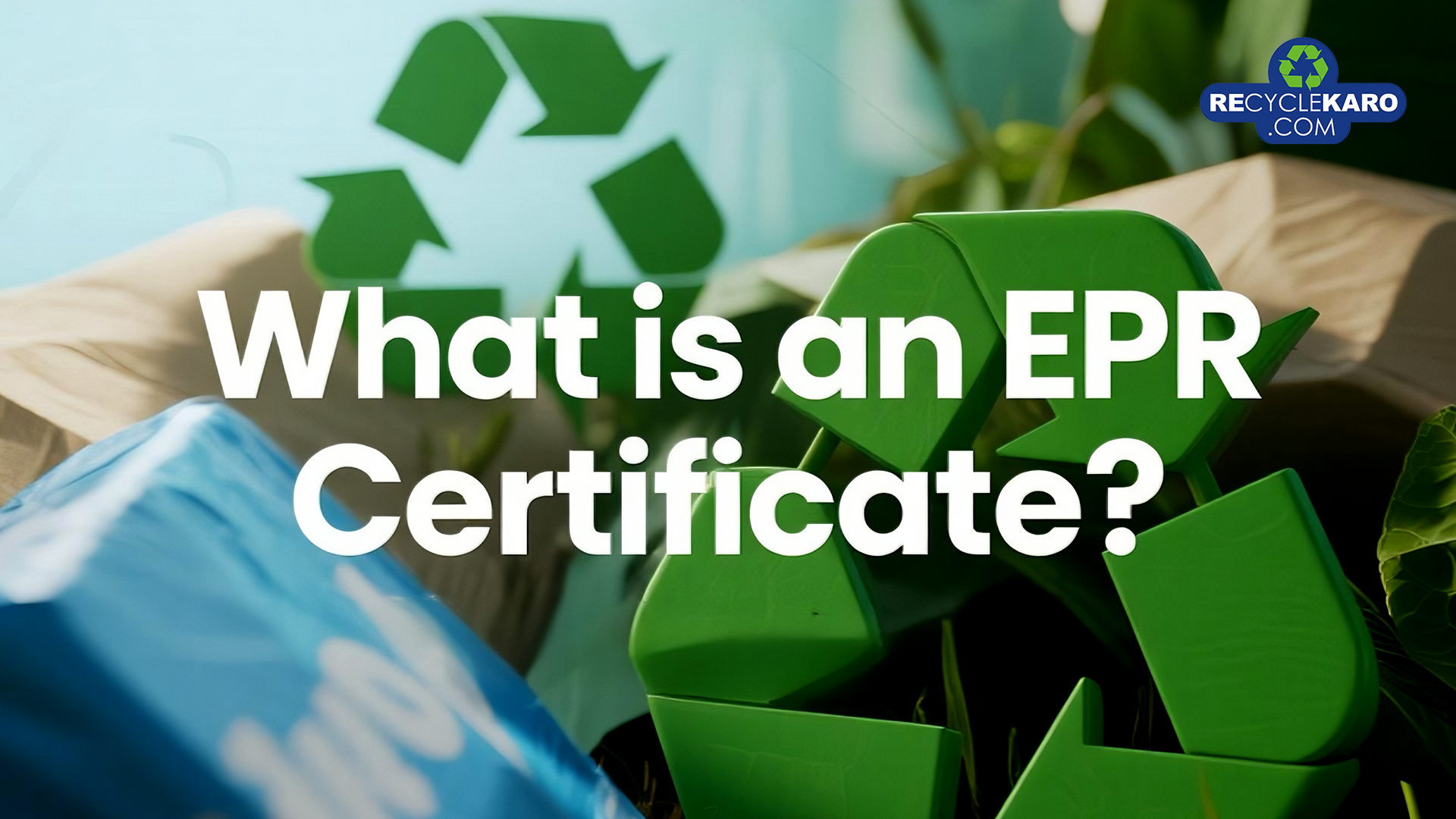
An EPR certificate confirms your business complies with India’s waste management rules. You get this certificate from the Central Pollution Control Board (CPCB) after registering. It holds producers, importers, and brand owners responsible for recycling their products’ waste. Businesses need an EPR certificate to avoid fines and operate legally in 2025.
India’s EPR rules cover e-waste, plastic packaging, batteries, and tires. The EPR certificate ensures you manage end-of-life products.
Over 5,000 businesses registered for EPR certificates last year. At RecycleKaro, we help companies like yours secure EPR certificates efficiently.
According to CPCB guidelines updated in 2024
What Is an EPR Certificate?
An EPR certificate is a mandatory document that proves your business handles waste responsibly. You apply for it online through CPCB portals. This certificate targets producers, importers, and brand owners (PIBOs) of items like electronics and plastics.
The EPR certificate shifts waste management costs to you, the producer. It promotes recycling and reduces landfill use. For example, if you import electronics, your EPR certificate outlines recycling targets.
Key benefits include:
- Legal compliance to avoid penalties up to ₹1 lakh.
- Access to EPR credits for trading recycled materials.
- Enhanced brand reputation in sustainable markets.
Data from the Ministry of Environment, Forest and Climate Change (MoEFCC) shows EPR certificates recycled 1.2 million tons of e-waste in 2024.
What Is the EPR Certificate Full Form?
Recycling e-waste conserves resources, reduces pollution, and generates employment opportunities. India, the third-largest e-waste generator globally, per a 2023 UN report, benefits immensely from recyEPR certificate full form stands for Extended Producer Responsibility certificate. It extends your duty beyond selling products to managing their waste.
This full form highlights your role in the product’s lifecycle. You collect, recycle, or dispose of waste. For instance, plastic producers must meet annual recycling quotas under their EPR certificate.
What Is EPR Certificate for Import?
EPR certificate for import ensures imported goods’ waste gets managed in India. You need it if you import electronics, plastics, or batteries.
Importers apply via CPCB’s import-specific portal. This certificate prevents customs delays. For example, without an EPR certificate for import, your shipment risks rejection.g e-waste.
What Is EPR Certificate for Plastic Waste?
EPR certificate for plastic waste requires you to recycle plastic packaging you produce or import. It targets single-use plastics and multi-layered packaging.
You register on the EPR plastic portal. This certificate sets quotas like 30% recycling in year one, rising to 100% by 2028. Plastic waste processors can sell credits to you.
How to Apply for EPR Certificate Online?
Apply for your EPR certificate online through CPCB’s centralized portals. You start by creating an account on sites like eprplastic.cpcb.gov.in for plastics.
Follow these steps:
- Visit the relevant CPCB portal.
- Fill Form 1 with business details.
- Upload documents like PAN and GST.
- Pay the fee online.
- Submit and track your application.
Approval takes 30-45 days. Use consultants if you’re new to this.
How to Apply for EPR Certificate?
Apply for EPR certificate by gathering documents first. You need incorporation proof, product details, and waste management plans.
Offline options exist but online is faster. Submit to your State Pollution Control Board if needed. Track status via email updates.
What Is the EPR Certificate Cost?
EPR certificate cost starts at ₹10,000 for application fees. You pay based on your business size and waste type.
For e-waste, costs range from ₹10,000 to ₹50,000 initially. Annual renewal adds ₹5,000 to ₹50,000. Plastic EPR certificate cost includes credit purchases at ₹0.5-₹2 per kg.
What Are EPR Certificate Fees?
EPR certificate fees include registration, processing, and annual charges. You pay ₹1,000 for small businesses up to ₹50,000 for large ones.
Fees vary by state. Delhi charges extra for inspections. Include consultant fees of ₹20,000-₹1 lakh.
Here’s a table of estimated fees:
| Waste Type | Application Fee (₹) | Annual Fee (₹) | Credit Cost (per kg/ton) |
| E-Waste | 10,000-50,000 | 5,000-50,000 | 10-50 per kg |
| Plastic | 5,000-20,000 | 2,000-10,000 | 0.5-2 per kg |
| Batteries | 15,000-40,000 | 5,000-30,000 | 20-100 per ton |
| Tires | 10,000-30,000 | 3,000-15,000 | Varies |
Data from industry reports, 2025.
Who Needs EPR Certificate Consultants?
You need EPR certificate consultants if your business lacks expertise in compliance. Consultants handle applications and audits.
They save time and reduce errors. Fees start at ₹20,000. At RecycleKaro, our consultants guide you through EPR certificate processes.
What Is EPR Certificate Exemption?
EPR certificate exemption applies to small producers under 1,000 kg annual waste. You qualify if your turnover is below ₹20 crore.
Exemptions cover certain recycled materials. Check CPCB guidelines for your category. Apply for exemption via Form 2.
Why Do Businesses Need an EPR Certificate in 2025?
Businesses need an EPR certificate in 2025 to comply with updated MoEFCC rules. It prevents fines and supports India’s circular economy.
New 2025 rules mandate 60% recycling for plastics. Without it, you face supply chain disruptions.
How Does EPR Certificate Benefit Your Business?
EPR certificate benefits your business by boosting sustainability credentials. You attract eco-conscious customers.
It opens credit trading markets. For example, sell excess credits for profit. RecycleKaro helps maximize these benefits.
What Documents Do You Need for EPR Certificate?
You need these documents for EPR certificate:
- PAN and GST certificates.
- Incorporation proof.
- Product list and waste estimates.
- Recycling plan.
- Authorized signatory details.
Submit digitally for faster processing.
How Long Does EPR Certificate Approval Take?
EPR certificate approval takes 30-60 days. You speed it up with complete documents.
Delays occur from incomplete forms. Track online.
What Happens If You Don’t Get an EPR Certificate?
If you don’t get an EPR certificate, you face fines up to ₹2 crore. Authorities can shut your operations.
Imports get blocked at customs. Reputation suffers.
For Importers: How to Get EPR Certificate for Import?
Importers get EPR certificate for import by registering on CPCB’s import portal. You submit import licenses and waste plans.
Process mirrors general application but adds customs details.
For Plastic Businesses: EPR Certificate for Plastic Waste Details
Plastic businesses use EPR certificate for plastic waste to meet quotas. You report quarterly.
Buy credits if short. Costs average ₹1 per kg in 2025.
EPR Certification vs. Other Certifications: Key Differences
EPR certificate focuses on waste, unlike ISO 14001 for general environment.
| Certification | Focus | Cost (₹) | Validity |
| EPR | Waste Management | 10,000+ | 1-5 years |
| ISO 14001 | Environmental Systems | 50,000+ | 3 years |
| Green Label | Product Eco-Friendliness | 20,000+ | 2 years |
Regional Variations in EPR Certificate Rules
EPR certificate rules vary by state. Maharashtra adds local audits.
Currency is INR, but exporters note USD conversions.
For Beginners: Simple Guide to EPR Certificate
Beginners start with understanding EPR certificate basics. Register online if you produce waste.
Use free CPCB resources.
For Advanced Users: EPR Certificate Credit Trading in 2025
Advanced users trade EPR credits on platforms. Prices: ₹0.5-₹2/kg for plastic.
Strategy: Over-recycle to sell extras.
For Agencies: Helping Clients with EPR Certificate
Agencies assist clients by managing EPR certificate applications. Charge 20% markup.
Partner with RecycleKaro for expertise.
For In-House Teams: Managing EPR Certificate Internally
In-house teams handle EPR certificate by training staff. Use software for tracking.
Saves consultant costs.
Why Buy EPR Credits from RecycleKaro?
Extended Producer Responsibility (EPR) credits are essential for businesses in India to meet regulatory targets under the E-Waste (Management) Rules, 2022, and Battery Waste Management Rules. These credits allow producers, importers, and brand owners to offset their waste management obligations by purchasing from certified recyclers. Buying EPR credits from RecycleKaro ensures seamless compliance, cost efficiency, and sustainability alignment.
RecycleKaro stands out as a leading e-waste and lithium-ion battery recycler in Mumbai, with over 13 years of experience. They offer EPR credits through their advanced processes, achieving 90% metal extraction efficiency and 99% purity from scrap materials. As the first Indian company to recycle EV batteries at scale, they help you fulfill targets for e-waste, plastics, and batteries. Benefits include transparent tracking via the CPCB EPR portal, financial incentives that make recycling viable, and support for your sustainability goals. Their zero-waste policy ensures nothing goes to landfills, promoting a circular economy while reducing your environmental footprint.
RecycleKaro’s compliances bolster trust. They are registered on the Central Pollution Control Board’s EPR portal, compliant with MoEFCC regulations. Certifications include ISO 14001 for environmental management and R2 for responsible recycling, meeting global standards. Awards like the Seeds Young Achievement Award (2015) and Recycling Business of the Year (2017) highlight their excellence. With AI-powered sorting and strategic partnerships, they guarantee secure data destruction and high recovery rates.
Choose RecycleKaro for reliable EPR credits—avoid penalties up to ₹2 crore, enhance your brand’s eco-reputation, and contribute to India’s green future. Contact them today at recyclekaro.com to start.
Frequently Asked Questions About EPR Certificate
Can You Renew EPR Certificate Online?
Yes, renew your EPR certificate online before expiry.
What Is the Penalty for No EPR Certificate?
Penalties include fines and business closure.
How Does EPR Certificate Affect Imports?
It mandates waste plans for imported goods.
At RecycleKaro, we specialize in EPR certificate services. Contact us to get your EPR certificate today.

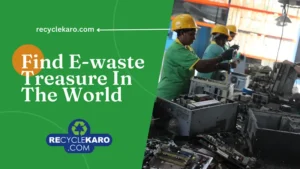
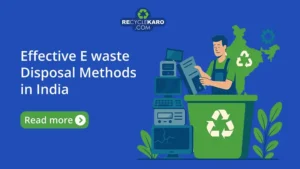
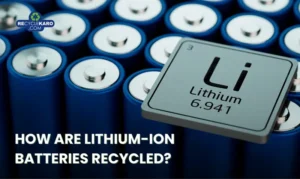
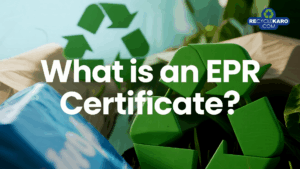
Visit the official website of the licensed Vavada casino today to start betting with your welcome bonus. Top up your balance after logging into your Vavada account to increase your loyalty status and get cashback after losses